Honey and Sage Skillet Cornbread and a Visit to Green Goddess Farms in Asheville, North Carolin
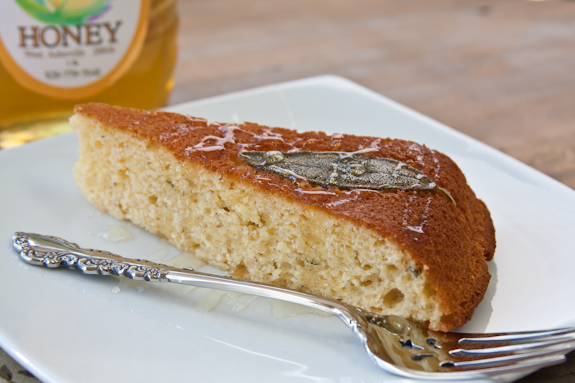
Carl told us that many of the younger farmers in Asheville are getting into beekeeping and they would not dream of treating the bees. It is a good thing that is the case since bees will travel within a three mile radius and then come back to their hives.
Since there are literally one hundred beekeepers in the 28806 zip code (in Asheville) and eight of them within a half mile radius from Green Goddess Farm, the hope is that the newer beekeepers are following his no treatment approach since these bees cross pollinate.
According to an article posted in the New York Times just yesterday, “A fungus tag-teaming with a virus have apparently interacted to cause the problem (the loss of bees), according to a paper by Army scientists in Maryland and bee experts in Montana in the online science journal PLoS One.
Exactly how that double-whammy kills bees remains uncertain, the scientists said — a subject for the next round of research. But there are solid clues: both the virus and the fungus proliferate in cool, damp weather, and both do their dirty work in the bee gut, suggesting that insect nutrition is somehow compromised.”
It will be interesting to see how this new information affects the methods and theories that the Chesicks have going forward.
Since their bees are thriving, Carl and Joan had a banner honey year this year. They had twenty gallons of spring honey, twenty-five gallons of summer honey and five gallons of Sourwood honey. You can find their honey at the West Asheville Tailgate Market or at Joan’s office. She is an audiologist in Asheville.
I know that bee pollen is used for medicinal purposes and that honey is known to have great health benefits. I was not aware of something called propolis or “bee glue”. This is something that the bees collect and use to seal cracks in their hives, among other things. Carl will gather this resin by carefully scraping it from the screens of the hives and then he makes a tincture from the resin. This tincture is known to have numerous healing qualities.
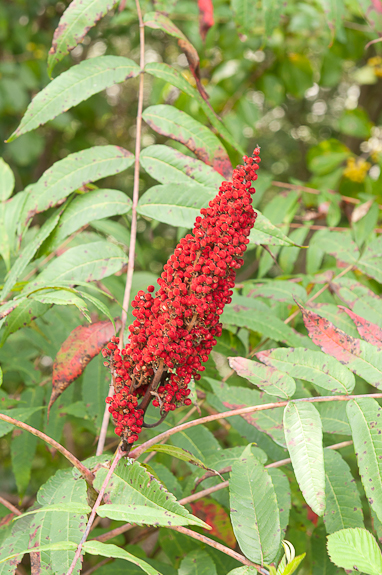
Carl also told us that they are trying to get a honey standard put in place. Honey is a pure varietal, very much like wine. All honeys taste very different and they will be different depending on their origins. The only way to truly confirm the type of honey is to identify the pollen under a microscope and that’s complicated.
Unfortunately, many people are not honest about what they are selling. Honey is becoming very expensive, especially with the loss of so many bees. Sadly, some people are slapping a label on sugar syrup or high fructose corn syrup with food coloring and additives and are calling it honey.
Carl said you should be sure to read the entire label on the honey you are about to purchase. You may find that a “Product of the U.S.” can contain ingredients that have been repackaged and actually originate from another country. That is where the trouble begins. Be sure to get your honey from a local source that you can trust. Where’s your honey from? That is what I want to know.
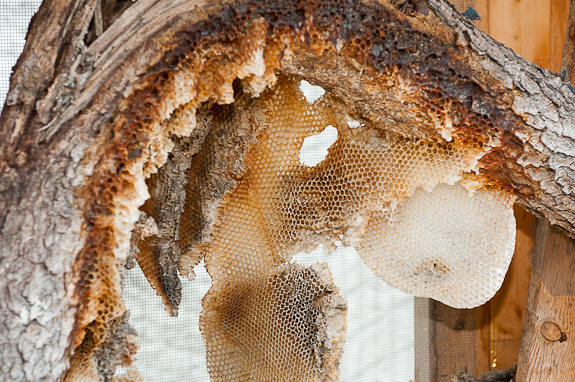
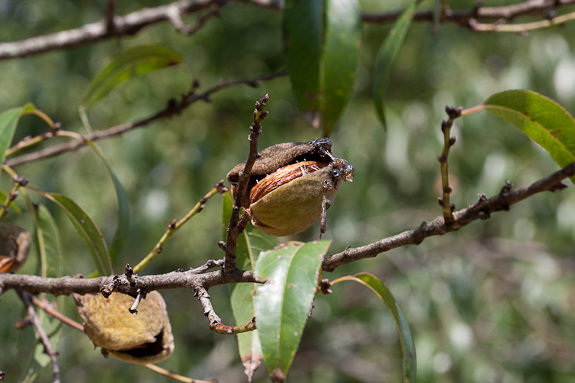
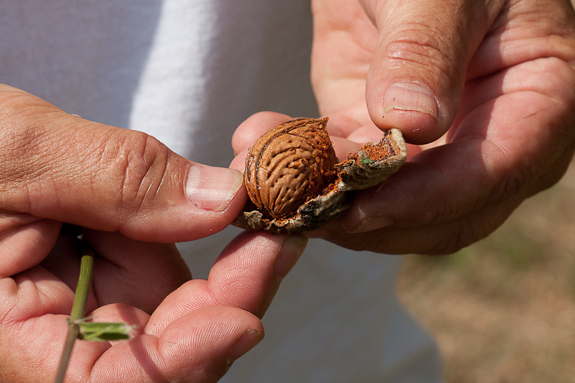
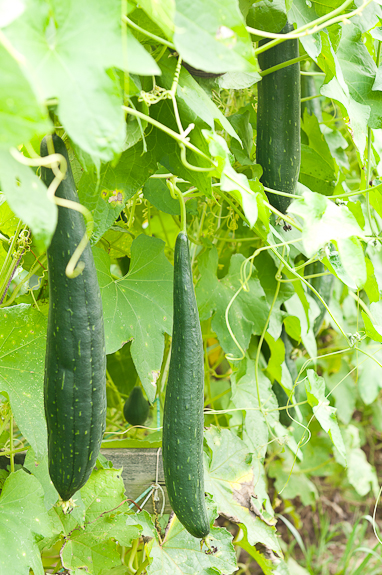
















Of course you did! You are such a wonderful blogger because not only do you highlight great ingredients…but you take us directly to the source. I just love it! I also have been using honey more and more in recent months. It was so intriguing to see an actual honeybee farm, and to hear about Carl’s philosophy on keeping his bees healthy and strong. And then the cornbread looks delicious. No surprise there!
Oh WOW! Amazing. I love this post.
wow this is amazing, did you use a macro lens on the bee’s what a shot…lovely post!
I really love this post. What a great visit to NC and some great info about raising bees! Thanks!
Thanks for sharing! I’ll have to get out to Asheville now. It’s so disturbing how easily we can be lied to about our food – corn syrup disguised as honey. Thanks for the alert.
Again, Gwen is amazingly prescient when it comes to news. The information about the latest academic/military research about the loss of bees is fresh off the web. Aside from that, this is a honey of a story (all right, all right!). Leave it to Mr. Bunkycooks to comb through (yeah, I tried it again….) sources and find a sweet one!
Great story, Gwen! As you know, I represent a honey company (Honey Ridge Farms) and they, too, maintain strict standards in caretaking of their bees. It comes from 5 generations of beekeeping experience and devotion.
One thing folks can do when purchasing honey is checking the label to see that the honey is USA locally sourced. Many small producers are including that to separate themselves from the imports. Another bonus, those same small producers have the quality control tools in place to trace their honey back to its original source. A very important factor these days.
Another neat fact re. healthy/honey: buying local honey can also help to build immunity to pollen allergies, since the bees, too, eat local! It’s like taking tiny allergy shots and helps to lessen pollen sensitivity. However, those with severe allergic reactions (asthma) should proceed cautiously.
Can’t wait to try that beautiful cornbread – grazie for the recipe and the wonderful story. I wish the Chesicks all the best and thank them for their incredible work.
I certainly got any education on why the bees have been disappearing and the natural way to raise them. Great job, wonderful post and recipe. I’m going to check my honey jar right now:)
I love honeybees! Someday I would love to have my own but for now I buy local honey. And now I know what I will do with it next! Delish!
What a great post…I love honey, but allergic to bees…so I have never seen up close. This cornbread looks fantastic 🙂
Your cornbread is amazing. I love the sage leaf in there very, very much.
I did know about the bees dying off. I’ve heard that part of it is because of a decrease in the amount of pink clover and that one thing we can do to help the wild bee population is to scatter pink clover on open fields.
Hey Gwen, thanks for the article. We harvested our sourwood honey last month, got a good harvest. We have not used chemicals for the last three years, but did lose them last year. Stop by sometime, will give you some sourwood. Keep on blogging! Lenny
Another fabulous road post Gwen, thanks for sharing tons of interesting information. I had not heard of this great bee loss but felt the price increase ouch! Lets not forget about honey and biscuits, something I never heard of until I moved down here!
I love bees I find them fascinating. We had a wild hive in our yard for a few years. The neighbors complained but I refused to get rid of it. Then one day about 2 months ago, the abandoned the hive and moved on. Di you have any idea why? Now that you are an expert! GREG
Hi Greg,
Bees are fascinating and I never knew the honey making process was so involved. It’s amazing what you learn about your food when you look into it. I certainly am not an expert, although I thought I knew one of the reasons your bees disappeared. I asked Carl and this is his response:
“The natural ‘life’ of a hive in the wild is said to be about 3 years. As the comb ages the wax absorbs bad things like chemicals or disease spores (one of the immune adaptations for honeybees.) It’s possible the hive died – if they left sometimes trying to fly away from sickness, or if no stores they might leave for ‘the promised land.’ Most likely scavengers – wax moths and small hive beetles – will eat the comb – essentially sterilizing the cavity. There’s also a chance another swarm will take up residence in spring – if there are enough bees in the neighborhood.”
Hope that answers the mystery!
Gwen
Wow… Gwen that’s a great post. So informative, and how fun is that to be on the road going to all those great farms. Lucky you. The skillet bread looks delicious I love cast iron skillets they are so versatile.
So glad I landed on your site. I’m planning a cornbread and honey extravaganza at my house later this week. Something so comforting about this snack.
Thanks for all the info too. It’s really evident that you care about your food and the facts behind it. You’re an inspiration!
Your cornbread is gorgeous – the sage leaf pattern is simple but stunning 🙂 The fork is just beautiful too. These things always catch my eye LOL
Thank you so much for all the information on honey and bees – I didn’t know the half of it! Btw, your photography is always good but in this post, it’s just breathtaking! I love the bees in midflight shots….
The cornbread looks picture perfect with the leaves 🙂
It’s so sad to hear about the plight of honeybees, and is such a serious issue. I didn’t realise there was a problem with ‘counterfeit’ honey, but I guess it’s not such a surprise.
You’ve also reminded me that I have some loofah seeds lying around somewhere that I forgot to plant!
I luv honey. When I was growing up, my Dad forbade commercial syrups in our home for pancakes, waffles, etc. We had to use honey. Bees are so important, I hope scientist really are making strides in saving them. Fantastic post, Gwen. This honey and sage skillet cornbread looks amazing…I need a skillet like that!
You’re so right about honey being a varietal. We get ours from the farmers’ market, and wouldn’t you know, the valley honey tastes different than the hillside honey. 🙂
That’s a mean lookin’ RV you got there. Winnebago? It looks very similar to ours. Can’t wait to see where you travel next!
[K]
We recently stopped in a specialty store selling various types of “local” honey. When we looked carefully at the label we realized that it was packaged locally and the honey came from places like Honduras and other overseas locations. You really have to be careful when selecting honey. Local honey has real health benefits (alleviates allergies and supports our local farmers). The next time you go shopping for honey, be on the lookout for honey that is truly locally produced. It may cost a little more but it is well worth it.
Mmm, this looks delicious 🙂 I love a simple recipe that tastes delicious! Great photos too!!!
Learn a lot about bees and honey today. Your corn bread looks delish and I like the sage in it. I am sure it taste good. I yet to own one cast iron skillet.